Source: www.bic.org

GENEVA—16 February 2024—On the morning of 12 February, in the Iranian city of Qaemshahr, a group of young Baha’is had gathered in a private home owned by a Baha’i woman, Maryam Zabihi Zamani, when 15 agents of the Ministry of Intelligence burst in and proceeded to raid the premises in an attack on the simple act of working to acquire knowledge. The young Baha’is were at the home to sit an exam as part of their informal studies in the Baha’i Institute for Higher Education. Iran’s government bars young Baha’is from entering the country’s established universities—forcing Baha’is to meet in private homes and through informal groups to pursue university-level studies.
The agents began filming as soon as they raided the home and showed a blatant disregard for the rights and dignity of the assembled Baha’i individuals. Agents questioned and insulted the group, searched the property, and confiscated electronic devices, textbooks, documents and personal items from Mrs. Zabihi and the young Baha’is.
The violent and insulting behavior of the agents towards Mrs. Zabihi provoked the objection of her son, Bahamin Zamani, which then resulted in the agents beating him with brutal force in front of his mother and the others.
The raid occurred 30 minutes after the exam started—demonstrating that the action was a targeted and deliberate attack on a group of Baha’is gathered just to study together.
Maryam Zabihi Zamani and four of the young Baha’is present were also issued summonses and are due to present themselves this Saturday, 17 February, to the Iranian authorities. Agents also raided the home of one of the young Baha’is, searched that property, and confiscated belongings.
“Imagine meeting one morning in a private home to take an exam, instead of in the classrooms from which you have been barred for 45 years because of your religion,” said Simin Fahandej, the Baha’i International Community’s (BIC) Representative to the United Nations in Geneva. “The government then raids the home, beats you and arrests you, all just for studying, trying to follow your dreams and to hold a profession.”
“All your peers are studying together in recognized institutions while you are making do with informal studies, in living rooms and kitchens, knowing that you may not even be able to work in your chosen field because you will have no formal qualifications. And imagine that, despite all this, you start the exam that morning with your mind on your work and your heart set on the future, when instead you are violated and terrorized by a government that persecutes you because of a deluded religious prejudice which has distorted and damaged Iranian society for generations. And imagine that these agents, working for a government that should be protecting you instead of punishing you, beat your friends and their families after they reacted to the abuse of their fellow Baha’is.”
“If you can imagine all that then you can see the appalling nature of what happened to this group of innocent Baha’i students,” Ms. Fahandej added.
“What exactly is illegal in the eyes of the Iranian government? To study? To learn? To accompany others in their quest to acquire knowledge?” Ms. Fahandej said. “Why debar Baha’i youth from studying or gathering together to learn? Ultimately, which is illegal: a government policy that excludes its citizens from higher education on the basis of their religious affiliation, or gathering with your friends to learn when you’ve been banned from universities around the country?”
Iran is a signatory to international covenants protecting access to education and other human rights. But since the 1979 Islamic Revolution and the 1980s Cultural Revolution, the Baha’is, the country’s largest non-Muslim religious minority, have been denied access to universities and suppressed in every area of life. Last year the BIC also reported that Baha’is who tried applying to university were being asked to sign a declaration form renouncing their beliefs to gain entry. Denying higher education is core to the Iranian government’s policy to “block the progress and development” of the Baha’i community.
The latest raid also follows the BIC’s concern that Iranian authorities are using intensified and brutal new tactics in its efforts to persecute Baha’is across the country.
“Iran’s government has spent 44 years trying to crush the Baha’i community and to separate them from the rest of Iranian society,” Ms. Fahandej said. “One of the ways they have done this is to block Baha’is from university—to try to stop them from studying and from forming friendships with their peers. The recent Our Story Is One campaign shows us that these efforts have failed.”
Ms. Fahandej added: “The government has, instead, started to also deprive other Iranians of higher education just for believing in gender equality and justice. Iranians now understand they are one people with one shared aspiration. Iranian authorities can do their part to show they stand with their people by canceling the summons against Mrs. Zabihi and the other Baha’is and by ceasing any more attacks on the community.”
Leave a Reply